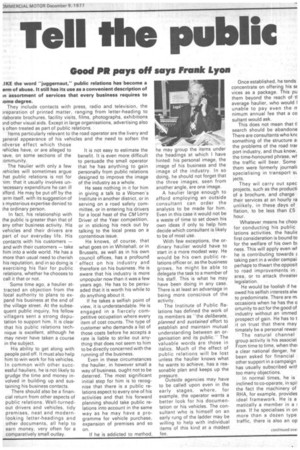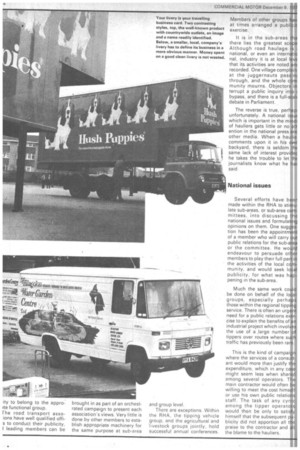Tell the public
Page 45

Page 46

If you've noticed an error in this article please click here to report it so we can fix it.
Good PR pays off says Frank Lyon
_IKE the 'word "juggernaut," public relations has become a erm of abuse. It still has its use as a convenient description of in assortment of services that every business requires to rome degree.
They include contacts with press, radio and television, the geparation of printed matter, ranging from letter-heading to )Iaborate brochures, facility visits, films, photographs, exhibitions ind other visual aids. Except in large organisations, advertising also s often treated as part of public relations.
The haulier with only a few tehicles will sometimes argue hat public relations is not for
that it usually involves unlecessary expenditure he can ill 3fford. He may be put off by the :erm itself, with its suggestion of 3 mysterious expertise denied to the ordinary person.
In fact, his relationship with the public is greater than that of any other business activity. His vehicles and their drivers are part of our everyday life. His contacts with his customers — and with their customers — take him into a wide world. He has a more than usual need to cherish his reputation, and in so doing is exercising his flair for public relations, whether he chooses to call it that or not.
Some time ago, a haulier attracted an objection from the local authority to plans to expand his business at the end of the village street. At the subsequent public inquiry, his fellow villagers sent a strong deputation to support him. It is clear that his public relations technique is excellent, although he may never have taken a course in the subject.
His ability to get along with people paid off. It must also help him to win work for his vehicles. In common with other successful hauliers, he is not likely to grudge the time and money involved in building up and sustaining his business contacts.
There should also be a financial return from other aspects of public relations. Well-turnedout drivers and vehicles, tidy premises, neat and modernlooking letter-headings and other documents, all help to earn money, very often for a comparatively small outlay. It is not easy to estimate the benefit. It is even more difficult to persuade the small operator that he has anything to gain personally from public relations designed to improve the image of the industry as a whole.
He sees nothing in it for him in giving a talk to a Women's Institute in another district, or in serving on a road safety committee, or in entering his drivers for a local heat of the CM Lorry Driver of the Year competition, or in sticking his neck out by talking to the local press on a contentious issue.
He knows, of course, that what goes on in Whitehall, or in Brussels, as well as in his own council offices, has a profound effect on his industry and therefore on his business. He is aware that his industry is more unpopular now than it was a few years ago. He has to be persuaded that it is worth his while to do anything about it.
If he takes a selfish point of view, it is understandable. He is engaged in a fiercely competitive occupation where every item of cost counts. The type of customer who demands a list of those costs before he accepts a rate is liable to strike out anything that does not seem to him to be directly concerned with the running of the business.
Even in these circumstances the haulier, in however small a way of business, ought not to be deterred. The most significant initial step for him is to recog nise that there is a public re lations aspect to every one of his activities and that his forward planning should take public re lations into account in the same way as he may have a pro gramme for vehicle purchase, expansion of premises and so on.
If he is addicted to method, he may group the items under the headings at which I have hinted: his personal image, the image of his business and the image of the industry. In so doing, he should not forget that the three images, seen from another angle, are one image.
A haulier large enough to afford employing an outside consultant can order the analysis to be made for him. Even in this case it would not be a waste of time to set down his own ideas if only to help him decide which consultant is likely to be of most use.
With few exceptions, the ordinary haulier would have to start in a more modest way. He would be his own public relations officer or, as the business grows, he might be able to delegate the task to a member of his staff. This is what he may have been doing in any case. There is at least an advantage in being more conscious of the activity.
The Institute of Public Relations has defined the work of its members as "the deliberate, planned and sustained effort to establish and maintain mutual understanding between an organisation and its public." The valuable words are those in italics. Much of the effect of public relations will be lost unless the haulier knows what he wants to achieve, has a reasonable plan and keeps up the pressure. Outside agencies may have to be called upon even in the early stages, where, for example, the operator wants a better look for his documentation or his vehicles. The consultant who is himself on an early rung of the ladder may be willing to help with individual items of this kind at a mOdest fee. Once established, he tends concentrate on offering his sc vices as a package. This pu them beyond the reach of tl average haulier, who would I unable to pay even the rr nimum annual fee that a co sultant would ask.
This does not mean that ti search should be abandone There are consultants who knc something of the structure al the problems of the road trar port industry, and thus know, the time-honoured phrase, wF the traffic will bear. Some them were formerly journali! specialising in transport st. jects.
They wil carry out spec projects, such as the producti of a brochure, and charge their services at an hourly ra unlikely, in these days of flation, to be less than E5 hour.
Whatever means he choo! for conducting his public lations activities, the hauli€ first consideration is bound to for the welfare of his own bi ness. This will apply even wF he is contributing towards E taking part in a wider campai perhaps to thwart the opposit to road improvements in area, or to attack threater legislation.
He would be foolish if he owed his selfish interests alw to predominate. There are rru occasions when he has the o ortunity to act for the good of industry without an immed prospect of gain. He has to t it on trust that there may timately be a personal rewar,
The natural channel group activity is his associat From time to time, when thei a clear national danger, he been asked for financial . other support in a campaign has usually subscribed wit too many objections.
In normal times, he is inclined to co-operate, in spil the fact the machinery of RHA, for example, provides ideal framework. He is a matically a member in a area. If he specialises in on more than a dozen type traffic, there is also an op ity to belong to the approite functional group.
ihe road transport assoions have well qualified offis to conduct their publicity, I leading members can be brought in as part of an orchestrated campaign to present each association's views. Very little is done by other members to establish appropriate machinery for the same purpose at sub-area and group level.
There are exceptions. Within the RHA, the tipping vehicle group, and the agricultural and livestock groups jointly, hold successful annual conferences. Members of other groups at times arranged a publ exercise.
It is in the sub-areas there lies the greatest sc Although road haulage national, or even an intern nal, industry it is at local I that its activities are noted recorded. One village cornpl at the juggernauts pas through, and the whole c munity mourns. Objector terrupt a public inquiry in bypass, and there is a fulldebate in Parliament.
The reverse is true, per unfortunately. A national i which is important in the m of hauliers gets little or no ention in the national press other media. When a ha comments upon it in. his backyard, there is seldom same lack of interest provi he takes the trouble to let journalists know what he said.
National issues
Several efforts have b made within the RHA to sti late sub-areas, or sub-area c mittees, into discussing national issues and formula opinions on them. One sug tion has been the appoint of a member who will carry public relations for the subor the committee. He wo endeavour to persuade ot members to play their full pa the activities of the local c munity, and would seek I publicity, for what was h pening in the sub-area.
Much the same work co be done on behalf of the lo groups, especially perh those within the regional tipp service. There is often an urg need for a public relations e cise to explain the benefits of industrial project which invol the use of a .large number tippers over routes where s traffic has previously been ra This is the kind of cam pai where the services of a cons ant would more than justify I expenditure, which in any c might seem less when shar among several operators. T main contractor would often willing to meet the cost hims or use his own public relatio staff. The task of any cy among the tipper operat would then be only to sati himself that the subsequent blicity did not apportion all t praise to the contractor and the blame to the hauliers.




































































































